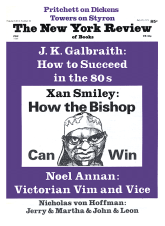By the recent death in Oxford of Max Hayward, at the early age of fifty-four, British learning suffered the loss of one of the few really outstanding scholars in the Russian field to have emerged here since the war. He had a profound knowledge of Russia and of things Russian, and his judgment was unerring and penetrating, and never eccentric, wrong-headed, or sentimental as is regrettably so often the case with students of the Soviet Union.
Hayward was a superb linguist, not only of Russian, in knowledge of which he outshone many a native speaker, but of the many languages which he acquired with a rapidity and facility which astonished his friends. As translator from the Russian mainly, but not exclusively, of works which were stifled by the Russian censorship, he had no rival. Apart from his widely known translations, such as those of Pasternak and Mrs. Mandelstam, we should also recall the fascinating experiment in which he collaborated in 1966. Together with Patricia Blake, he edited a collection of poems by Andrei Voznesensky called Antiworlds. A few he translated himself, but the majority were rendered into English by one of six American poets, with Max Hayward supplying the literal translation and information on the rhythm, assonance, and allusions of the original. The result seems to me an outstanding success in something that is the greatest challenge that ever faces a translator—W.H. Auden’s versions, in particular, are exquisite new poems in English, yet scrupulously faithful in language and in spirit to the Russian.
I think Max Hayward’s achievement as a translator was as much a matter of character as of skill. His lack of vanity, his dedication to truth—he was the most truthful human being I ever knew—his academic integrity which made him search relentlessly for the author’s meaning were some of the reasons for the high quality of the result. In the apt phrase of Patricia Blake, with whom he frequently collaborated, “Max acted as the custodian of Russian literature in the West until such time as it could be restored to Russia.” Another reason for his excellence as translator was his English style—austere and of an elegance which is rare these days.
Max Hayward’s work, translations apart, survives in numerous introductory essays, lectures, and articles which it is much to be hoped will be collected and published. To everything that he wrote he brought the same qualities: insight, brevity, above all integrity. He never wrote a book. I think, in his heart, he was too modest, diffident almost, to do so—a quality not often found among academics. But from these shorter pieces his extraordinary gifts shine like a flash of light, encapsulating in a few words the essential significance of the work he was editing or introducing.
In his academic life, at Columbia and St. Antony’s, Oxford, where he was a Fellow, he was an inspiring, patient, and serious teacher and guide, as many of his former students have told me. He aroused in them the same kind of affection and respect that he evoked from his numerous friends on both sides of the Atlantic, in Greece, in Israel. Perhaps, indeed, his most memorable quality was his gift for friendship, and this, too was a matter of character. He did not override his friends with his own vanity. He was reserved about his own feelings, as if fearing to obtrude them on others. He had great talent for observation and his judgments were always fresh, original, and stimulating. Those who were privileged to enjoy his friendship know that the world is a poorer place now that he is gone.
—Leonard Schapiro
This Issue
July 19, 1979



